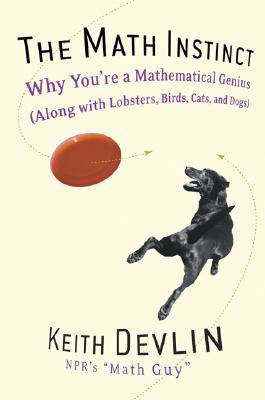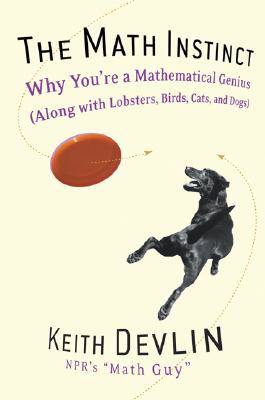
Je cadeautjes zeker op tijd in huis hebben voor de feestdagen? Kom langs in onze winkels en vind het perfecte geschenk!
- Afhalen na 1 uur in een winkel met voorraad
- Gratis thuislevering in België vanaf € 30
- Ruim aanbod met 7 miljoen producten
Je cadeautjes zeker op tijd in huis hebben voor de feestdagen? Kom langs in onze winkels en vind het perfecte geschenk!
- Afhalen na 1 uur in een winkel met voorraad
- Gratis thuislevering in België vanaf € 30
- Ruim aanbod met 7 miljoen producten
Zoeken
The Math Instinct
Why You're a Mathematical Genius (Along with Lobsters, Birds, Cats, and Dogs)
Keith Devlin
Paperback | Engels
€ 37,45
+ 74 punten
Omschrijving
There are two kinds of math: the hard kind and the easy kind. The easy kind, practiced by ants, shrimp, Welsh corgis -- and us -- is innate. What innate calculating skills do we humans have? Leaving aside built-in mathematics, such as the visual system, ordinary people do just fine when faced with mathematical tasks in the course of the day. Yet when they are confronted with the same tasks presented as "math," their accuracy often drops. But if we have innate mathematical ability, why do we have to teach math and why do most of us find it so hard to learn? Are there tricks or strategies that the ordinary person can do to improve mathematical ability? Can we improve our math skills by learning from dogs, cats, and other creatures that "do math"? The answer to each of these questions is a qualified yes. All these examples of animal math suggest that if we want to do better in the formal kind of math, we should see how it arises from natural mathematics. From NPR's "Math Guy" -- The Math Instinct will provide even the most number-phobic among us with confidence in our own mathematical abilities.
Specificaties
Betrokkenen
- Auteur(s):
- Uitgeverij:
Inhoud
- Aantal bladzijden:
- 288
- Taal:
- Engels
Eigenschappen
- Productcode (EAN):
- 9781560258391
- Verschijningsdatum:
- 31/05/2006
- Uitvoering:
- Paperback
- Formaat:
- Trade paperback (VS)
- Afmetingen:
- 135 mm x 201 mm
- Gewicht:
- 335 g

Alleen bij Standaard Boekhandel
+ 74 punten op je klantenkaart van Standaard Boekhandel
Beoordelingen
We publiceren alleen reviews die voldoen aan de voorwaarden voor reviews. Bekijk onze voorwaarden voor reviews.









